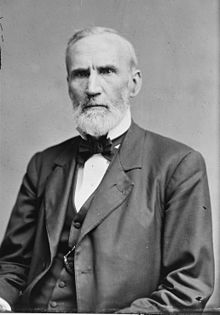George Washington Julian | |
|---|---|
 | |
| Member of the U.S. House of Representatives from Indiana | |
| In office March 4, 1849 – March 3, 1851 | |
| Preceded by | Caleb Blood Smith |
| Succeeded by | Samuel W. Parker |
| Constituency | 4th district |
| In office March 4, 1861 – March 3, 1871 | |
| Preceded by | David Kilgore |
| Succeeded by | Jeremiah M. Wilson |
| Constituency | 5th district (1861–69) 4th district (1869–71) |
| Personal details | |
| Born | May 5, 1817 Centerville, Indiana, U.S. |
| Died | July 7, 1899 (aged 82) Irvington, Indiana, U.S. |
| Political party | Whig (Before 1848) Free Soil (1848–1855) Republican (1855–1872) Liberal Republican (1872–1873) Democratic (1873–1899) |
| Spouse(s) | Anne Finch (1845–1860) Laura Giddings (1863–1884) |
| Children | 5 |
| Signature | |
George Washington Julian (May 5, 1817 – July 7, 1899) was a politician, lawyer, and writer from Indiana who served in the United States House of Representatives during the 19th century. A leading opponent of slavery, Julian was the Free Soil Party's candidate for vice president in the 1852 election and was a prominent Radical Republican during the American Civil War and the Reconstruction era.
Born in Wayne County, Indiana, he established a legal practice in Centerville, Indiana. He won election to the Indiana House of Representatives as a member of the Whig Party. He helped found the anti-slavery Free Soil Party and won election to the United States House of Representatives, but was defeated in his attempt to secure a second term. During his time in Congress, he became a staunch supporter of land reform policies such as the Homestead Acts. After leaving Congress, Julian served as the Free Soil Party's vice presidential nominee in 1852, and the ticket won 4.9% of the popular vote.
After the passage of the Kansas–Nebraska Act, Julian became a leader of Indiana's nascent Republican Party, and he won election to the United States House of Representatives in 1860. He helped secure passage of the 1862 Homestead Act and called for the abolition of slavery. While he was a firm supporter of President Abraham Lincoln, he also criticized some of President Abraham Lincoln's wartime policies and favored the Wade–Davis Bill over Lincoln's more lenient Reconstruction proposals. He voted in favor of the Thirteenth Amendment, which abolished slavery in the United States and famously feuded with Solomon Meredith, a fellow Hoosier and commander of the Union Army's Iron Brigade during his 1865 re-election campaign.
After the war, he emerged as a prominent critic of President Andrew Johnson, calling for Johnson's impeachment. After Johnson was impeached, he was one of seven House members that were tasked with writing the articles of impeachment. Julian introduced a women's suffrage constitutional amendment in 1868. Julian lost his bid for re-nomination in 1870, and eventually resumed his legal practice in Indianapolis. He opposed the administration of President Ulysses S. Grant and became a leader of the Liberal Republicans. After Grant defeated Liberal Republican nominee Horace Greeley in the 1872 presidential election, Julian became a member of the Democratic Party. In 1885, President Grover Cleveland appointed him surveyor general of the New Mexico Territory. Julian was the son-in-law of Ohio politician Joshua Reed Giddings and the father of Grace Julian Clarke, a women's suffrage advocate.